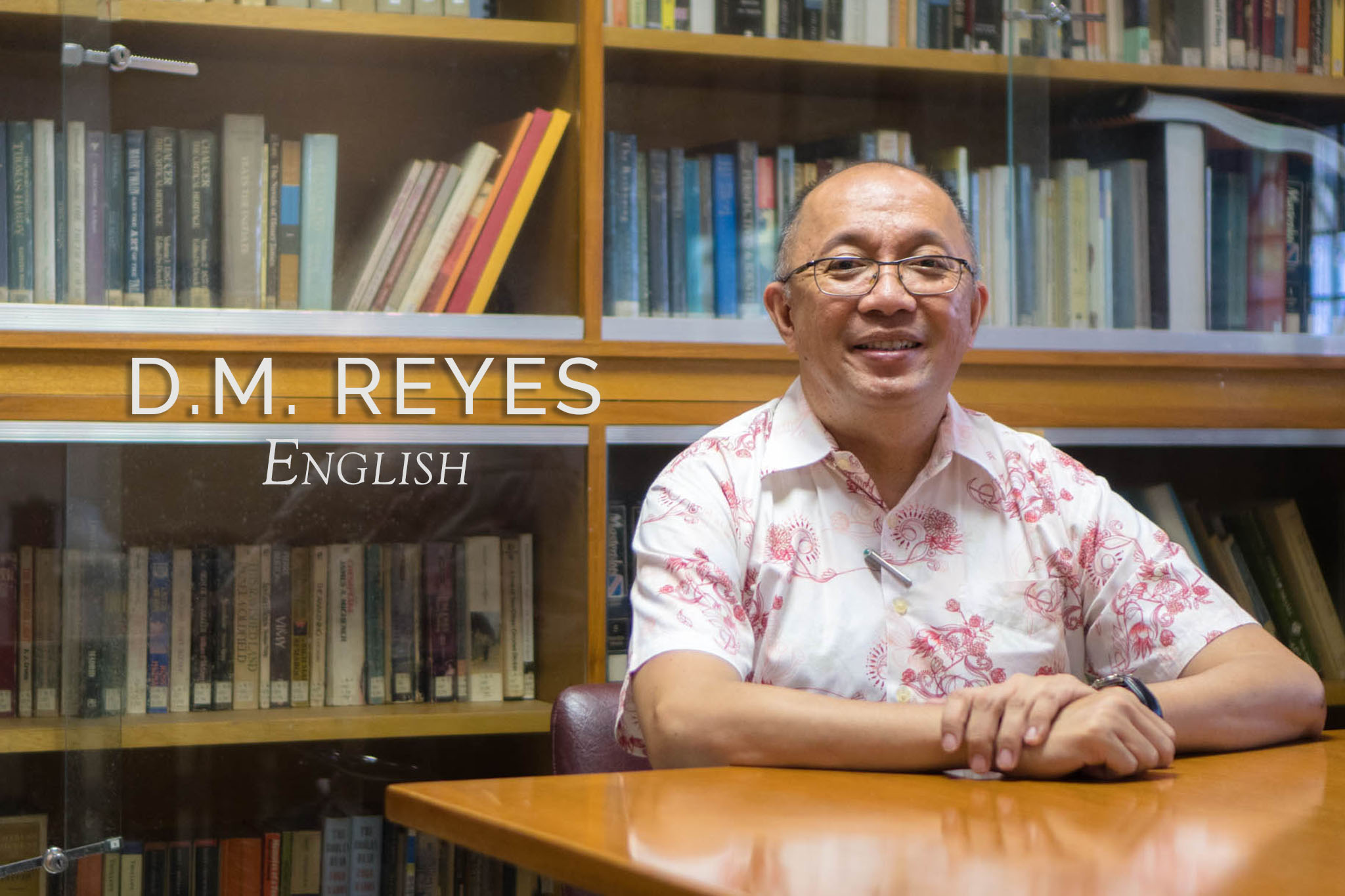Written by Joel Lim, with help from Ehry Chua, and Denise Joaquin. Edited by Denise Joaquin and Matthew Yuching.
Photo Header by Patricia Dy and Archie Onglim.
If you would ask Ateneans on who was a professor that changed their lives, chances are that Sir Danilo M. Reyes (or Sir D.M. as affectionately called by his students and colleagues) is one of them. Having been teaching for the past thirty years, Sir D.M. mentored several generations of M01 Merit English students, who have accumulated his countless stories, quotable quotes and insightful and memorable lectures on both literature and life itself. Outside the Ateneo, he has partaken and judged in countless writing workshops and has written several literary works. He can be seen around the campus with his flowery polos and his signature umbrella, ready to strike at whoever mentions the words “basically” and “actually” in class.
This interview has been edited and condensed for clarity.
On his life as a student of the Ateneo:
“I have several [memorable professors] and if you’d allow me to mention at least three… One of them is Dr. Edna Manlapaz. She had a flair for theater even as she was discussing the history of the novel. I believe she trained with the late Zenaida Amador of Repertory Philippines, so it was just simply mesmerizing to see her performing ideas on the teacher’s platform.”
“And then there was Dr. Soledad Reyes, whose commitment and passion to Philippine literature opened my eyes to be proud of our own literature whether in the so called vernacular, or the one written in English. She has read so many pieces in our own literary tradition and it’s from her that I got this sensibility appreciating the substance of our own cultural productions in literature.”
“And then, the last one is Fr. Joseph Galdon who was the teacher’s teacher. He has this very inventive, creative ability of just presenting everything that is in a book in a way that students would appreciate, so later on, you go back and read the book and you realize that you know the stuff that the book is talking about because Fr. Galdon has presented it to you in a very personable and inventive way.”
On his life as a teacher of the Ateneo:
“There were a lot of many memorable moments with my students; some of them were intellectually provocative, but there were also funny moments. One was when a student accosted me on account of my flowery shirt and just asked, ‘Sir, are those jute prints– Marijuana printed on your shirt.’ And then I said, ‘Well, I’m trying to figure out myself if these are jute leaves.’”
“The other one was of course discovering that one class had opened a Twitter account, and it was running everyday, quoting a line or two from what I would say in class. It freaked me out a bit because I said, ‘What about the grammatical lapses and all of the incoherent phrases?’ But they had done it quite tastefully, [with them] picking out lines that appealed to them on account of the discussion. It was funny because we were getting reactions from people outside of the Ateneo drawn to their own causes and finding echoes or reinforcements from those lines that they were posting.”
“I have an almost allergic reaction to too much sun, so I have to go around with an umbrella, always ready just in case it gets very warm because my skin reacts to the sun. And along the way, it must be [the] usual to see an old person lugging an umbrella around. After a while, you get curious questions or comments like ‘That’s Mary Poppins’ from the English Department’, or one time they said that his umbrella is like the ceiling of the Sistine Chapel because it’s all black on the outside, but there’s a painting inside, and you have to see it for yourself. You have students approaching, [saying:] ‘May we see your umbrella?’ And then they’d say, ‘Oh, it’s true, it’s true.’”
“So I thought that after a while, the umbrella was becoming part of the lore of walking into the classroom. I said, just one day, I said to my students, by way of exhorting them, ‘You better do well in life. If you plan to be inside Malacañang, or the Congress, or the Senate, you better make the Ateneo proud of what you’re going to do, because if not, I’m going to parachute from nowhere, brought down by my umbrella, and I’m going to attack you with that umbrella – bludgeoning you for embarrassing not only your old teacher, but your university for that matter.’ And I guess from that day on, that drove home a point among the students, so I became prouder about lugging around my umbrella.”
On his favorite literature:
“There’s a certain wonder and depth to each poem that you have to discover for yourself, and I guess that’s the irony of it. We think that what could charm in literature is a sum of three or four sentences which when stated by the teacher will make everybody listen, but I guess it’s more than that. You look into a poem. You step into its world, and you are drawn by it. While I have some favorites like I could think of Robert Frost’s ‘Reluctance’; there would be the ‘Archaic Torso of Apollo’ by Rainer Maria Rilke; there are many lovely poems, [like the] lyrical poems of [Pablo] Neruda, and even a haiku or two that I could claim to be a personal favorite of mine.”
“What I’m saying is when someone enters the world of a poem, you enter it fully and it’s an experience that no one can take away from you. I’m sure if I talk to you and I ask you what poems speak to your heart, you would probably mention a couple of titles that I might not be familiar with, but the passion with which you’re going to speak about how those poems moved you and touched your heart cannot be looked down upon. So in essence, I’d like to say that what the students are ready to discover on their own, [and] what the reader is most ready to explore on his or her own would give a rather profound experience which may or may not be helped along by the teacher.”
“One of my favorite short stories is Julio Cortázar’s ‘The End of the Game’ where three girls who liked to put up a show at the railway station, [where] they will strike a pose and don costumes and jewelry to mesmerize the train passengers. One of them, a young man, falls in love with the three of them, and one day, he drops a note and he says, ‘I’m going to be stopping by very soon because I’d like to meet the three of you in person.’ But then, he also says, ‘The prettiest among you is the laziest,’ and he has no idea that she is a paraplegic. The young man is deeply in love with her, so it’s a very unusual love story because she knows very well that she’s not pretty in the usual way that society would expect.”
“Knowing that it’s not going to work out, she writes him a goodbye letter. And she says, ‘I’m going to play the game one last time’. The girls steal everything that is precious in their house. They strike a pose, and she’s glittering with the most beautiful things, like she’s Venus rising from out of the sea. You could guess her entire body was aching from having done it, but you know she had done it out of love. The day after, only the two other girls go back and they find out that the young man is no longer in his usual seat. The story ends with the two girls kind of thinking, ‘Oh, he probably moved to the other side of the train.’ And I like it because instead of saying goodbye, they have this phrase which is in lieu of a goodbye.”
“The man, when he wrote the letters, always signed by saying, ‘para siempre’ which in English, translates to ‘until always.’ It’s not goodbye, but it’s a way of bidding someone that ‘I’m going,’ and then you sign off and you say ‘until always.’ There was a time when the M0 classes were using that and it became kind of a shared code. You don’t say goodbye, you say ‘until always.’ Until now, there are still some of them who would greet on Facebook or sign a card putting in ‘until always.’ I guess it’s moving in its own way.”
On learning from his students and his legacy:
“Learning never stops. It’s two ways. One might start out with a certain confidence claiming that, ‘I’m the teacher and that I know a whole lot that I can teach my students.’ But you find out along the way after more than three decades of being there that your own insights into a poem or a short story are further deepened by what your students are able to articulate. And it’s funny because these very deep insights or meditations stay with you and it’s the same.”
“Years later you meet a student and you remind him or her that [they] said this in class; it’s something brilliant and it’s something that I’ve incorporated in my appreciation of the poem or the short story. They are wide-eyed and they say, ‘Did I say that? Really, you have incorporated it in your lecture? Do I matter that much that it has to be there?’ I guess it’s two ways because students also come and say, ‘Mr. Reyes, you said this some time ago and it has stayed with me.’ And of course, I’m a bit nervous [and] surprised and I ask them, ‘Did I really say that?’ so the learning is two ways. You cannot be a hundred percent the teacher, [because] at some point, you’re the student yourself.”
“And I’m sure the most perceptive students feel that way. They learn something that they all said something very precious to contribute to the discussion so that you could be discussing the same poem or short story for thirty years but each time you do so, it means differently and you don’t feel tired. It’s not routine because there’s always something fresh and insightful that you discover about your material when you interact with the students.”
“There are many things that I’ve learned from my students, but I would like to recall an anecdote. Each time we discuss Shakespeare, either a play or the poems of Shakespeare, you see a very important concern is, ‘How do I live on in the world? How do I make sure that a trace of me or a shadow of me continues to survive in the world?’ And of course, Shakespeare has two ways of answering it. He would say, ‘First you should love, and marry, and have children because if you do so, then a part of you will be there to survive in the world. You children are your own flesh and blood, so the heritage that is your children becomes a way of assuring your continuity. There will be a shadow of you lingering in the world.’”
“And always, I would be stumped because my students would readily raise their hands and say, ‘But what about you, Mr. Reyes, you’re single? You don’t have a family?’ and for all of this profundity about what Shakespeare says, ‘Don’t you feel insecure, because you don’t have a shadow of you lingering in the world since you’re single anyway.’ It’s almost like saying, ‘When you die, then there’s no more of you.’”
“But I always tell my students there’s a second way by which Shakespeare says, ‘A part of you can continue to linger in the world, and it’s when you create beauty when you write a poem, when you go into art and you shape something beautiful, then you’re able to gain some part of that immortality that people are pining for because a part of you thrives and survives in the art, in the masterpiece that you are leaving behind.’ If I can share a part of my love of literature with some of you, if you cultivate it your whole life so that you continue to read and value books, and if you continue to have an outlook that is attuned to the beautiful, then I suppose I’m not wiped out altogether.”
“I could die and go and be forgotten, but if a part of my passion is passed on to those who have studied with me and who have tried to explore literature with me, then that’s some kind of a heritage that one can be proud of. A single person like me who will probably not have children takes hope that in what I teach, especially for instance, in Creative Writing, [that] those students who will decide to invest their own life and heart in creating imaginative writing…I think those are the moments of hope that help me feel that I’m not going to be wiped out entirely. That the part of me will continue to live on in the world.”
Get to know more about the Ateneo’s professors by following the Teachers’ Appreciation Week page!




